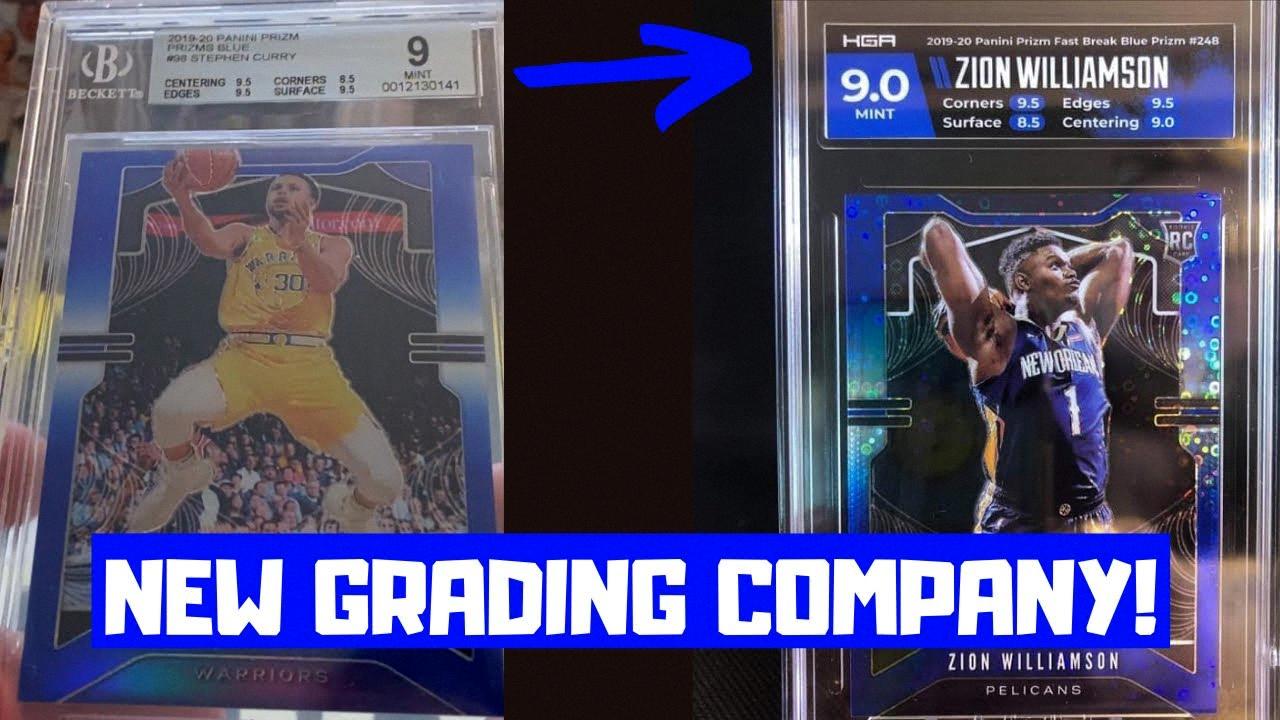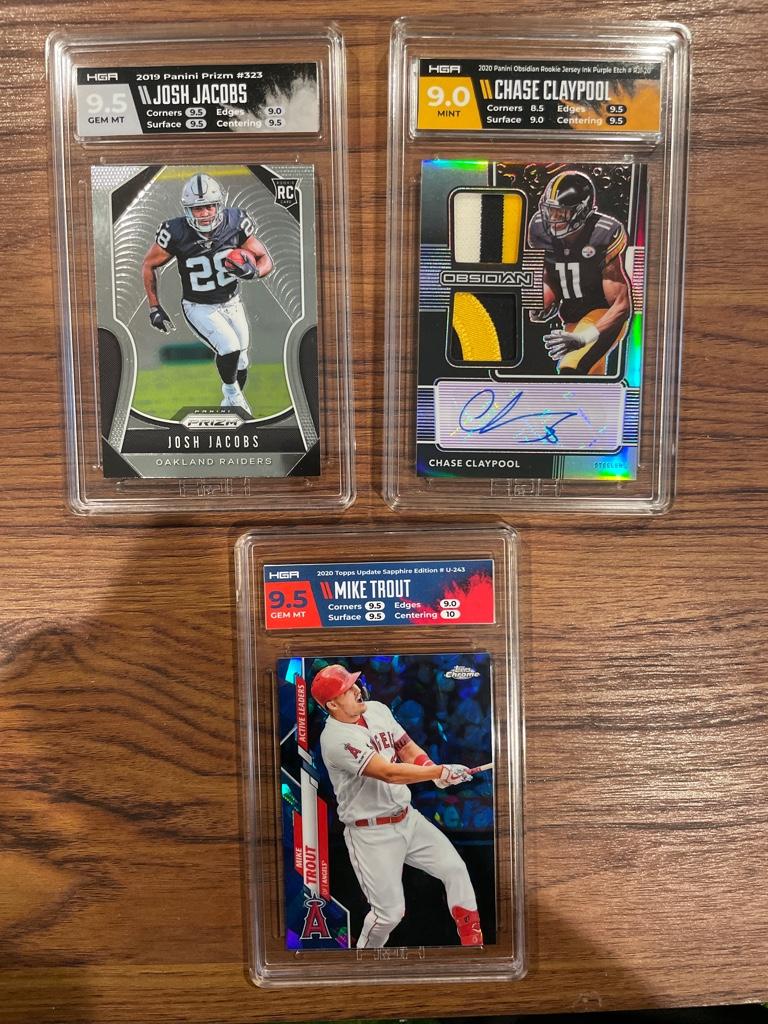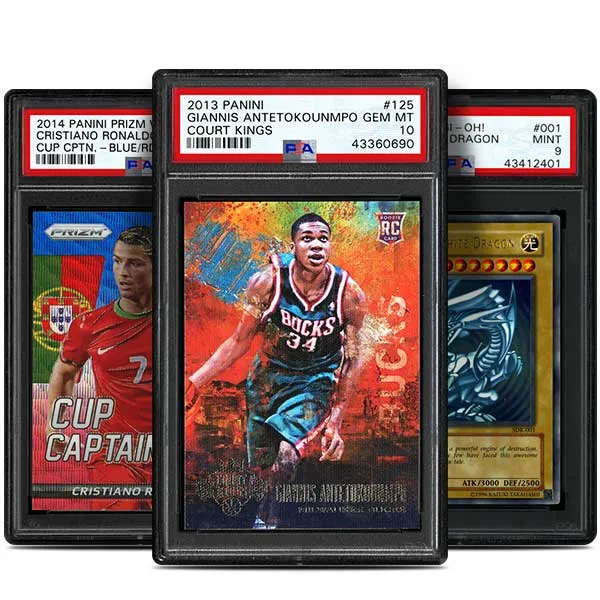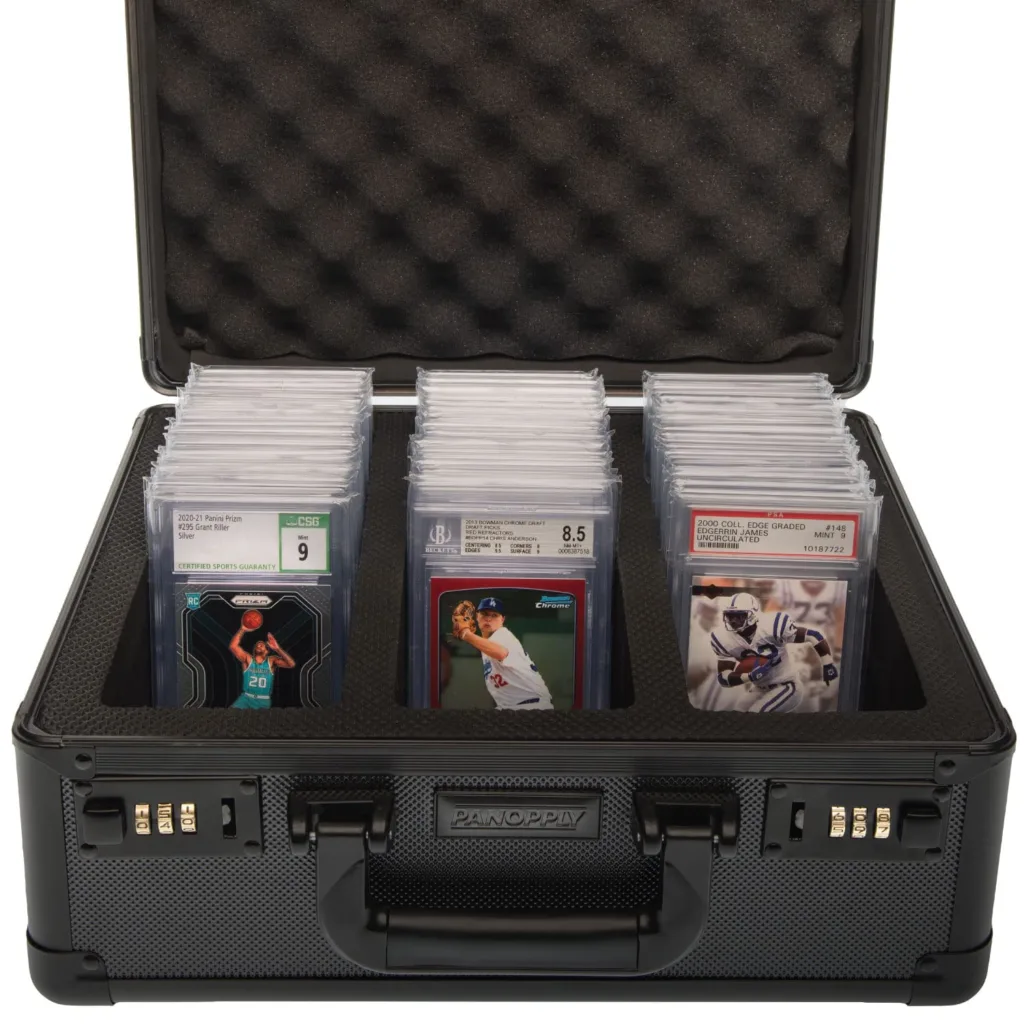If you’re a sports card collector, you’re probably already familiar with the concept of grading. Grading is the process of evaluating the condition of a card and assigning it a grade based on a set of criteria. A graded card is more valuable than an ungraded card, as it provides a clear indication of its condition and authenticity.
One of the newer players in the grading game is HGA, or Hybrid Grading Approach. HGA is a relatively new grading company that has quickly gained popularity among collectors. Here’s everything you need to know about HGA card grading:
HGA employs a hybrid approach to grading, which means they use both human graders and artificial intelligence to evaluate cards. They use a proprietary algorithm to scan cards and identify any imperfections. Then, human graders inspect the card to ensure the algorithm’s findings are accurate.
HGA offers three different grading tiers: Best Value, Popular, and Very Fast. The Best Value tier costs $20 per card and takes 60 business days to complete. The Popular tier costs $35 per card and takes 30 business days to complete. The Very Fast tier costs $50 per card and takes 10 business days to complete (for 1-20 cards).
HGA uses a 10-point grading scale to evaluate cards. Here’s what each grade means:
– 10: Flawless. A flawless card with no signs of wear or aging.
– 10: Pristine Mint. A nearly perfect card with imperfections not visible unless under magnification.
– 9.5: Gem Mint. Nearly perfect with barely noticeable tiny flaws. No creasing.
– 9.0: Mint. Four sharp corners with a slight nick or small surface scratch.
– 8.5: Near Mint-Mint+. Nearly perfect with a minor flaw that is only noticeable upon close inspection.
– 8.0: Near Mint+. Nearly perfect with a few minor flaws that are only noticeable upon close inspection.
– 7.5: Near Mint. Nearly perfect with a few minor flaws that are noticeable upon close inspection.
– 7.0: Excellent-Mint+. Excellent condition with minor wear visible upon close inspection.
– 6.5: Excellent+. Excellent condition with some noticeable wear.
– 6.0: Excellent. Excellent condition with more noticeable wear.
HGA uses a rigorous authentication process to ensure that every card they grade is authentic. They use a combination of technology and human expertise to verify each card’s authenticity, including holographic seals and tamper-proof packaging.
There are several other grading companies in the industry, including PSA, BGS, and SGC. Each company has its own strengths and weaknesses, and collectors often have their preferences. HGA has gained popularity among collectors for its modern approach to grading and its affordable pricing.
BGS, for example, offers four different submission tiers: Premium, Express, Standard, and Economy. The Premium tier costs $250 per card and takes 2-5 business days to complete, while the Economy tier costs $35 per card and takes 30-40 business days to complete.
HGA is a relatively new grading company that has quickly gained popularity among collectors. They use a hybrid approach to grading, combining artificial intelligence and human expertise to evaluate cards. Their pricing is more affordable than some other grading companies, and their authentication process is rigorous. If you’re conidering grading your cards, HGA is definitely worth exploring as an option.
Cost of Grading a Card at HGA
HGA, whih stands for Hybrid Grading Approach, is a newcomer to the sports card grading industry. If you are wondering how much it costs to grade a card at HGA, then you have come to the right place. HGA offers three grading tiers: Best Value, Popular, and Very Fast, each with a different turnaround time and price point.
The Best Value tier costs $20 per card and has a 60 business day turnaround time. This option is ideal for individuals who are not in a rush to get their cards graded and want to save some money in the process. The Best Value tier is perfect for bulk grading orders.
The Popular tier costs $35 per card and has a 30 business day turnaround time. This option is ideal for individuals who want their cards graded in a timely manner but don’t want to pay the premium for expedited service. The Popular tier is perfect for those who are not in a rush but still want their cards graded within a reasonable timeframe.
The Very Fast tier costs $50 per card and has a 10 business day turnaround time. This option is ideal for individuals who are in a rush to get their cards graded and are willing to pay a premium for expedited service. The Very Fast tier is perfect for those who want their cards graded quickly and efficiently.
It is important to note that the prices mentioned above are for grading 1-20 cards. If you have more than 20 cards to grade, then HGA offers bulk pricing options that can save you money on grading costs.
HGA offers three grading tiers at different price points to accommodate individuals with different needs and budgets. The Best Value, Popular, and Very Fast tiers cost $20, $35, and $50 per card, respectively, and have different turnaround times.

Source: youtube.com
What Is the Highest Grade in the HGA System?
HGA, or Hybrid Grading Approach, is a card grading company that evaluates the condition and quality of trading cards. The highest HGA grade possible is a perfect score of 10. A card that receives a grade of 10 is considered flawless, with no signs of wear or aging. It is an extremely rare and highly coveted grade that signifies a card is in pristine condition.
The next highest grade is a 9.5, which is considered gem mint. A card graded as gem mint will have barely noticeable tiny flaws, with no creasing. The card will also have sharp corners and no significant surface scratches.
Following that is a grade of 9.0, which is considered mint. A card graded as mint will have four sharp corners, but may have a slight nick or small surface scratch.
It is important to note that HGA utilizes a hybrid grading approach, which means they take into consideration both the card’s condition and the overall aesthetic appeal. This means that a card may receive a lower grade if it has significant flaws, even if it is still visually appealing.
The highest HGA grade is a perfect 10, folowed by a 9.5 and a 9.0.
Authentication of Cards by HGA
HGA (Hybrid Grading Approach) does authenticate cards. As explained by HGA President Tyler Hitt in a post shared by Cardporn, the company employs different specialists to authenticate and grade vintage and modern cards. This means that HGA has a team of experts who are trained and experienced in identifying authentic cards and distinguishing them from counterfeit ones.
When it comes to grading cards, HGA uses a hybrid approach that combines both traditional and modern grading methods. The company takes into account various factors such as the card’s condition, rarity, and overall appeal to determine its grade. HGA grades cards on a 1-100 scale, with 100 being the highest grade a card can receive.
In addition to their authentication and grading services, HGA also offers encapsulation and storage solutions to help protect and preserve cards. Encapsulation involves sealing a card in a plastic case to prevent damage from handling, while storage solutions such as sleeves and top loaders can help keep cards in good condition.
HGA offers a comprehensive range of services for collectors and enthusiasts looing to authenticate, grade, and protect their cards. With their team of experts and hybrid grading approach, collectors can trust that their cards are in good hands with HGA.
Comparing Card Grading Companies: Which is the Best?
When it comes to grading trading cards, there are several companies to choose from. However, only a few are widely recognized as the best in the industry. The top three grading companies are PSA, BGS, and SGC.
PSA, or Professional Sports Authenticator, is known for its strict grading standards and consistency. They use a 10-point grading system, with 10 being the highest grade a card can receive. PSA is widely regarded as the leader in the industry and is often the preferred choice for collectors of vintage and rare cards.
BGS, or Beckett Grading Services, is another popular grading company. They use a 10-point grading system as well as a sub-grade system for corners, edges, centering, and surface. This allows for a more detailed assessment of the card’s condition. BGS also offers a faster turnaround time for grading than PSA.
SGC, or Sportscard Guaranty, is the oldest grading company in the industry. They use a 100-point grading system, which some collectors prefer as it allows for a more precise grading assessment. SGC is known for its consistency and accuracy in grading, especially for vintage cards.
Ultimately, the best grading company for you will depend on your personal preferences and the type of cards you are grading. PSA is preferred for vintage and rare cards, wile BGS is known for its detailed grading system and faster turnaround time. SGC is a great option for those who prefer a 100-point grading system. It’s important to do your research and choose a reputable grading company that aligns with your needs and preferences.
Average Time for HGA Grading
HGA (Hybrid Grading Approach) is a relatively new player in the sports card grading industry, having launched in late 2020. HGA’s grading process is said to be faster than some of the more established grading companies like PSA (Professional Sports Authenticator) and BGS (Beckett Grading Services).
According to HGA’s website, their current turnaround time for grading services is aound 20-25 business days from the date they receive the cards. This is significantly faster than PSA’s average turnaround time of 8.5 weeks, and it can be a game-changer for collectors who want to receive their graded cards back quickly.
It’s important to note that HGA’s turnaround time is an estimate and can vary depending on various factors such as the volume of submissions they receive and the complexity of the grading process for each card. However, HGA has been receiving positive feedback from collectors who have used their services, and their quick turnaround time is one of the reasons why many collectors have been switching over to HGA.
In addition to their fast grading process, HGA also offers unique and customizable grading options such as colored labels, custom slab designs, and personalized grading notes. These features have also been well-received by collectors who want to add a personal touch to their graded cards.
HGA’s grading process is known for its speed, customization options, and quality grading standards. If you’re looking for a grading company that can provide quick turnaround times without sacrificing quality, HGA may be worth considering.

Obtaining a Free Card Grading
If you are looking to get your Pokémon cards graded, unfortunately, there is no way to do it for free. Grading services require time and effort from experienced professionals, and they charge a fee for their services. Additionally, you will have to pay for shipping to send your cards to the grading service and back to you.
However, there are a few things you can do to reduce the cost of grading your cards. One option is to wait for special promotions or discounts offered by grading services. These promotions are usually announced on their websites or social media pages, so be sure to keep an eye out for them.
Another option is to group your cards together and submit them in bulk. Many grading services offer discounts for larger submissions, so it may be more cost-effective to wait unil you have several cards to submit at once.
It is important to note that while there are some free online grading tools available, these are not official grading services and should not be relied upon for accurate grading. Official grading services provide a detailed assessment of the condition and value of your cards, and can be trusted by collectors and buyers alike.
While it is not possible to get your Pokémon cards graded for free, there are ways to reduce the cost of grading, such as waiting for promotions or submitting cards in bulk. Always use official grading services for accurate and reliable grading results.
Is a 69 Grade Considered Good?
When it comes to grading systems, a 69 is considered to be a passing grade, but it is on the lower end of the scale. In most cases, a grade of 69% would be equivalent to a D, whch is still considered passing, but not necessarily good. It’s important to keep in mind that what is considered a good grade can vary depending on the context. In some situations, such as highly competitive academic programs or job applications, a grade of 69% may not be seen as favorable. However, in other situations, such as non-academic settings or less competitive environments, a grade of 69% may be perfectly acceptable or even considered good. Ultimately, whether a 69 grade is good or not depends on the specific circumstances and expectations surrounding the evaluation.
Comparing the Effectiveness of HGA and PSA
HGA and PSA are both third-party grading companies that offer similar services for collectors and hobbyists. The main difference between the two is their approach to grading and their reputation in the industry.
HGA, also known as Hybrid Grading Approach, is a relatively new player in the grading industry. They offer a unique approach to grading that combines both human and artificial intelligence to povide a more accurate and consistent grading system. This means that their grading process is more transparent and objective, which can be beneficial to collectors who want a more reliable grading system.
On the other hand, PSA has been in the grading industry for over 25 years and is considered to be one of the most reputable grading companies in the industry. They have a proven track record of providing accurate and consistent grading services, which has earned them a loyal following among collectors and hobbyists.
So, is HGA better than PSA? It ultimately depends on the collector’s specific needs and preferences. Here are some factors to consider when choosing between the two:
– Cost: HGA’s grading fees are generally lower than PSA’s, which can be a significant factor for some collectors.
– Turnaround time: PSA has a reputation for longer turnaround times, whereas HGA has a faster turnaround time, which may be important for collectors who want their items graded and returned quickly.
– Reputation: PSA has established a strong reputation in the industry, while HGA is still relatively new and untested. However, HGA’s unique approach to grading may appeal to collectors who value transparency and objectivity.
– Longevity: As a relatively new company, there is some risk that HGA may not be around in the long term. PSA, on the other hand, has a proven track record of longevity and stability.
HGA and PSA both offer valuable grading services for collectors and hobbyists. Whether HGA is better than PSA ultimately depends on the collector’s specific needs and preferences.
The End of Card Grading by PSA
In recent months, PSA, one of the most well-known and respected companies for grading trading cards, had to halt their operations due to a massive influx of card submissions. This unprecedented demand, coupled with COVID-19-related staffing limitations, led to a significant backlog of ungraded cards that needed to be processed. To address this issue, PSA temporarily suspended its services to allow its team to catch up on the backlog of submissions.
However, the shutdown was not all bad news. PSA used the time to upgrade its grading capabilities by implementing new technologies and hiring more staff. These improvements will increase PSA’s capacity to reduce the backlog of submissions and improve the overall grading process.
The decision to halt operations was a necessary step for PSA to ensure that their grading services remain at the highest possible standards. With the upgrade in technology and the addition of more staff, the company can continue to proide quality grading services to collectors and traders alike.

Are Graded Cards Authentic?
Graded cards can certainly be fake. While grading companies such as PSA, BGS, and SGC have established themselves as trusted authorities on the condition and authenticity of sports cards, thre are still individuals who try to deceive collectors by passing off counterfeit or altered cards as the real deal.
One common method of creating a fake graded card is to take a lower-grade card and alter it to make it appear to be in better condition. This can involve techniques such as trimming the edges to make them appear sharper, or adding artificial gloss to the surface of the card to make it look more pristine. These alterations can be difficult to detect without close inspection, which is why it’s important for collectors to be diligent and knowledgeable when purchasing graded cards.
Another way that graded cards can be faked is by counterfeiting the grading label itself. This can involve creating a replica of the label and affixing it to a card that has not actually been graded by the authenticating company. Again, this type of fraud can be difficult to catch without careful examination of the card and its accompanying documentation.
To protect themselves from buying fake graded cards, collectors should only purchase from reputable sellers who have a proven track record of selling authentic cards. They should also carefully examine the card and its holder for any signs of tampering or alteration, and verify the authenticity of the grading label with the grading company itself. Additionally, collectors can educate themselves on the specific characteristics and markers of the cards they are interested in, which can help them spot fakes more easily.
While graded cards can be a valuable addition to a collector’s collection, it’s important to be aware of the potential for fraud and take steps to protect oneself from purchasing fake cards.
The Most Difficult Card Grading Company
When it comes to grading baseball cards, there are several companies in the market, but the one known for its tough grading standards is PSA (Professional Sports Authenticator). PSA is a well-respected third-party grading company that uses a 10-point grading scale to evaluate the condition of a card.
PSA is often considered the hardest card grading company because they have a reputation for being very strict and consistent in their grading. PSA grades cards based on several factors such as centering, corners, edges, and surface. They also have a unique hologram on the holder, making it easy to authenticate the card.
It’s important to note that PSA is not the only grading company in the market, and other companies such as Beckett and SGC also have their own grading standards. However, PSA is widely recognized as the industry leader, and their graded cards tend to command higher prices in the market.
PSA is considered the hardest card grading company due to their strict and consistent grading standards, whih have earned them a reputation as the industry leader.
Does Card Grading Increase the Value of Cards?
Card grading is a process where a professional grading company evaluates the condition and authenticity of a card and assigns it a grade. This grade is then encapsulated in a tamper-proof holder, giving the card a new level of protection and prestige. Many collectors believe that getting their cards graded will increase their value, but this is not always the case.
While thee are some exceptions, most cards that are graded will return less than if they were sold raw. This is because the cost of grading and encapsulating a card can be expensive, and the final grade assigned to the card may not be as high as expected. Additionally, some collectors prefer to have their cards in their original, ungraded state, as they enjoy the tactile experience of handling and examining them.
However, there are some instances where card grading can increase the value of a card. For example, if a card is rare or in high demand, having it graded and authenticated can give buyers confidence in its authenticity and condition. This can lead to higher prices at auction or in private sales. Additionally, if a card is in pristine condition and receives a high grade, it can command a premium price due to its rarity and desirability.
While card grading can increase the value of some cards, it is not a guarantee. Collectors should carefully consider the cost of grading and the potential return on investment before deciding to have their cards graded.
Finding the Cheapest Place to Grade Cards
If you are looking to grade your cards, there are a few options available to you. However, if you are looking for the cheapest place to grade your cards, then PSA is your best bet. PSA is one of the most reputable grading services in the industry, and their prices are very reasonable. It only costs about $20 to grade a card through PSA, which is much cheaper than some of the other grading services out there.
If you want to save even more money, you can try going to a hobby store or a person that grades cards for others. These individuals will often charge less than the official grading services, and the results are usually good. The cost per card is typically around $8-$10, which is a significant saving compared to the official grading services.
It’s important to remember that the cheapest option may not always be the best option. While PSA is relatively cheap, there are other grading services out there that may be better suited to your needs. Be sure to do your research and choose a grading service that offers the quality and value you are looking for.

Conclusion
HGA card grading is a new player in the world of card grading, but it has quickly gained popularity among collectors. The company offers three grading options with varying turnaround times and prices, making it accessible for collectors with dfferent needs and budgets.
HGA’s grading scale ranges from 10 (flawless) to 1 (poor), with half-point increments to provide a more nuanced grading system. The company employs different specialists to authenticate and grade vintage and modern cards, ensuring a thorough and accurate evaluation.
While HGA is a viable grading option, collectors should also explore the services of established grading companies such as PSA, BGS, and SGC. These companies have been in the industry for decades and have established credibility and reputation among collectors.
HGA card grading offers collectors a new and accessible option for evaluating their cards. The company’s grading scale and turnaround times provide flexibility for collectors, and their use of specialists ensures a thorough and accurate evaluation. However, collectors should also consider established grading companies for their expertise and reputation in the industry.
